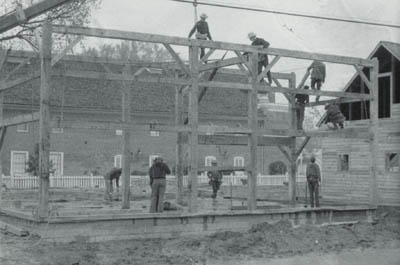Tenets: "Old Traditional Way of Life"A barn raising in New Harmony, IndianaWarren's concept of the "old traditional way of life" was not a way of relegating folk life to a backwards, unsophisticated level of social existence relative to elite society; quite the contrary, it was a way of highlighting the disparities between elite culture and the way most people actually lived their lives. Here he explains that the "old traditional way of life" is actually the foundation upon which contemporary American society is built: "It is not the elite society of the past that is primarily responsible for today's society no matter what the historian and the social historian may tell you. It is true that the elite society has influenced today's society in many ways but it is still the old traditional way of life that is today's society's main source. Let me cite a single example: child rearing in the elite society and the folk society of the past and in the United States today. There is much evidence to show that in the elite society of the past in England and the United States, the parents had little to do with their children once they were born. A newborn infant was put out with a "wet nurse," the aristocratic mother fearing that suckling her infant might "ruin her figure." The weaned infant was turned over to a "nanny" and then to a governess. At an early age, usually eight, boys were sent off to boarding schools. By the Victorian era this pattern began to change slightly as motherhood became more fashionable. It is important to remember that this pattern was followed by only a tiny percentage-less than five-of the total population for obvious reasons-you had to have plenty of money if you were going to follow it. On the other hand, children were raised at home and sent to nearby one-room schools by the vast majority of people. What of today's society? I believe I am correct in saying that, to most people today, the ideal is that children should be close to their parents. I realize that there are many circumstances when this closeness is impossible, but it still seems to me that family closeness is the ideal. Contemporary American society, then, in this important area follows the traditional society of the past and rejects elite society. It is true that most writers misunderstand or ignore traditional society and turn to elite society when they want to generalize on "how people used to live," ignoring the fact that they are talking about far less than five per cent of the total population when they deal with the elite." Warren Roberts, contribution to Symposium on Material Culture, Material Culture vol. 17 (1985), nos. 2-3, 91. |
